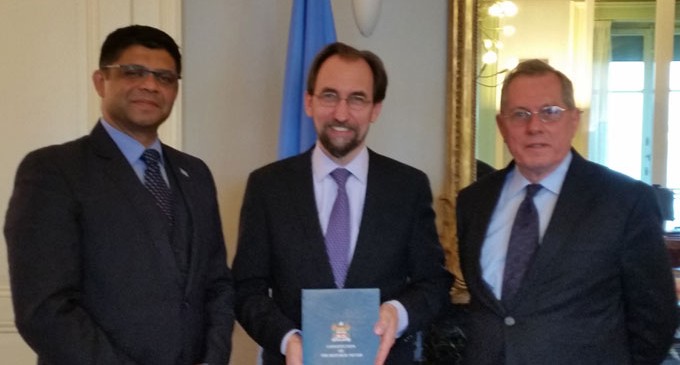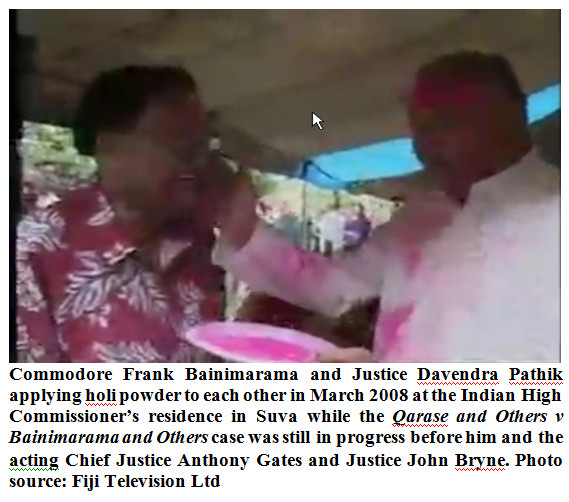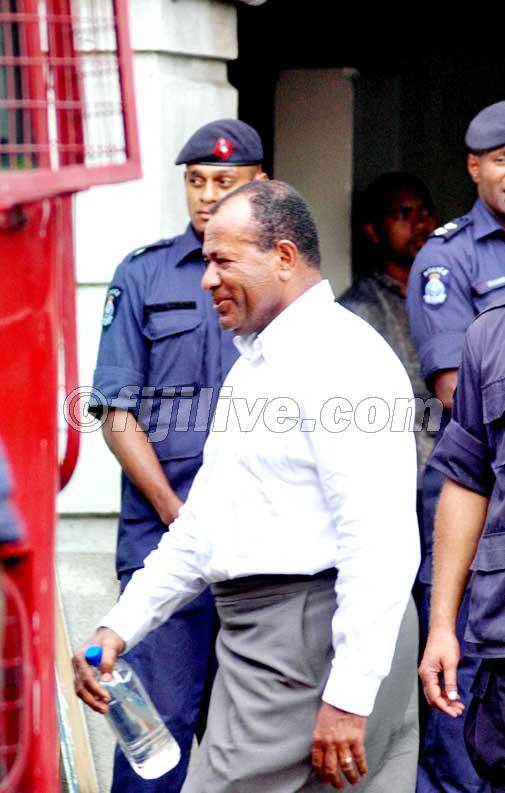Fijileaks: The trip to Geneva re-ignites the issue of recusal and perception of bias - the Fair-Minded And Informed Observer test:

By VICTOR LAL,
Fiji Sun, 2008
A judge chides a senior lawyer in a recusal case. Another judge questions the role of a fellow judge in a deportation case. The fellow judge lodges a complaint against that judge to an acting superior judge. But what about the non-judge, who wants answers from all the judges on a particular judge’s behaviour – in this case, that of Justice Davendra Pathik at the holi celebrations that took place at the residence of the Indian High Commissioner in March of this year.
Let me state my case at the very outset. I am not, and I repeat with a capital R, casting any aspersion on Justice Pathik’s character or his suitability to be a High Court judge. I first encountered Justice Pathik nearly 30 years ago when I was briefly a court reporter and he was a magistrate in the Suva courts. But as a newspaper columnist, I have been receiving endless questions on what is the legal position on the fear of apprehended bias regarding Justice Pathik’s behaviour on that joyous and religious occasion.
The occasion referred to is the colourful and joyous holi party at the residence of Prabhakar Jha, the Indian High Commissioner to Fiji, on 29 March 2008. The Fiji Television captured and relayed to the general viewing public Justice Pathik and interim Prime Minister Commodore Frank Bainimarama celebrating holi together at Mr Jha’s residence. Now, the same public wants to know whether Justice Pathik should have disqualified himself from writing the Qarase-Bainimarama judgment on the grounds that his conduct at the holi festival has given reasonable rise to an apprehension of bias.
How should one respond? Before responding, I want to dispute the interim Attorney-General Aiyaz Sayed-Khaiyum’s warning to the media that he would not tolerate any contempt of court and comments on the recent judgment and anybody bringing the judiciary or the administration of justice into contempt will be called to account for their actions. I presume he knows better as a student of law that the conduct of the judges and their judgements are open to scrutiny once a judgement has been delivered by a court.
His constant threats to the media only re-enforces “the all-too-common tendency to view the attorney-general and his department as no more than the law firm that is always on call to serve the interest of the political party that is in power at the time”. The A-G, despite his political role, and as supporter and advisor to the government, is meant to wear an apolitical hat in his parens patriae role as guardian of the public interest. The judiciary and the media are also guardians of the public interest.
In his fifth edition of Media Law (2008) Geoffrey Robertson QC, who successfully argued the Chandrika Prasad case before Justice Gates, writes on the issue of scandalising the court: “Scandalising the court was invented in the eighteenth century to punish radical critics of the establishment, such as John Wilkes [In the context of 18th century politics it was an attempt to protect Lord Mansfield from reasoned criticism of his oppressive judicial behaviour towards Wilkes and other critics of the Government]. Despite its apparent breath, scandalising the court should not prevent criticism of the judiciary even when expressed in strong terms. “Justice is not a cloistered virtue” a senior Law Lord (Lord Atkin, Ambard v Att-Gen for Trinidad and Tobago, 1936), once said, and comment about the legal system in general or the handling of particular cases once they are over sometimes deserves to be trenchant…Scandalising the court is an anachronistic form of contempt. Lord Diplock (Secretary of State for Defence v Guardian Newspapers Ltd (1985) has described is as “virtually obsolescent in the United Kingdom” and it has not been used here for 60 years.”
I want to state my case as follows. Imagine, if you will, a scenario where Justice Pathik, in the course of writing his judgment, along with acting Chief Justice Anthony Gates and Justice John Bryne, was forced to ask himself: “Don’t I know the Commodore from somewhere?” The answer would have been as follows, “Yes, Your Honour, from the Holi celebration where Fiji TV captured you and the Commodore exchanging coloured powder”.
So, what should his Honour have done? He should have, I want to humbly submit, based on AWG Group Ltd (formerly Anglian Water plc) and another v Morrison and another ([2006] EWCA Civ 6) Court of Appeal, Civil Division (Lord Justice Mummery, Lord Justice Latham and Lord Justice Carnwath) 20 January 2006, considered stepping down from the case. And if he had refused to step down, than Justices Gates and Bryne should have decided what course of action to take, to resolve the matter.
If we are to accept the “Morrison Principle”, Justice Pathik should have, in my humble submission, recused himself from hearing the case and writing up his judgment. As the three judges in Morrison ruled, disqualification of a judge for apparent bias was not a matter of discretion, and, in a case where the principle of judicial impartiality was properly invoked, inconvenience, costs and delay did not count.
In Morrison, the question arose, “Don’t we know each other from somewhere?” In that case, the trial judge, Justice Evans-Lombe was reading into a case on the eve of the trial when he realised that he knew one of the claimant’s proposed witnesses, one Mr Jewson. Justice Evans-Lome’s family had known Mr Jewson’s family for many years. Their children were friends, and they had attended dinner parties and played tennis together. The judge immediately informed the parties. In response, the claimant decided that it would not call Mr Jewson to give evidence. Notwithstanding the claimant's decision, the defendant asked Justice Evans-Lombe to withdraw.
Justice Evans-Lombe refused, as Mr Jewson was no longer being called as a witness. He took into account the delay, disruption and additional cost that would flow from having to find a new judge. The defendant appealed. Although there was no suggestion of actual bias, or that Justice Evans-Lombe had any personal interest in the outcome of the litigation, the defendant argued that there was the “real possibility of apparent bias”.
Lord Justice Mummery said that disqualification of a judge for apparent bias was not a discretionary matter. Inconvenience, costs and delay did not count in a case where the principle of judicial impartiality was properly invoked. That was because it was the fundamental principle of justice, both at common law and under article 6 of the European Convention on Human Rights. If, on an assessment of all the relevant circumstances, the conclusion was that that principle either had been, or would be, breached, the judge was automatically disqualified from hearing the case. In the unfortunate circumstances of the present (Morrison) case, the judge should have recused himself.
In Weber v The Queen (1994), the basic test for disqualification on the ground of apprehended bias was as follows: “Whether, in all circumstances, a fair-minded lay observer with knowledge of the material objective facts might entertain a reasonable apprehension that the trial judge might not bring an impartial and unprejudiced mind to the resolution of the question.” The test has been described a “double might test”" – a possibility, not a probability, of bias.
The rationale is that no person shall be a judge in his or her own cause and, secondly, that it is important to maintain public confidence in the fairness and impartiality of the judicial system. The legal question and debate is whether Justice Pathik’s conduct at the Indian High Commissioner’s residence had crossed the line into impermissible indications of bias.
In Pinochet (No 2), the House of Lords unanimously held that one of their brethren, Lord Hoffman, who had sat and determined R v Bow Street Metropolitan Magistrate, Ex parte Pinochet Ugarte (Pinochet No 1) was automatically disqualified from hearing the case because of the apprehension of bias. The House of Lords was prepared to automatically assume bias from Lord Hoffman’s relationship with Amnesty International, one of the interveners in the proceedings. This assumption of bias amounted to a departure from precedent.
It is worth pointing out that Pinochet had put the British judiciary in the glare of national and international public attention. Like all high-profile cases, lawyers and legal academics engaged in a prediction game, stating which judges will rule in favour of General Augusto Pincochet and which judges might go against him. A similar scenario was being played out in Qarase-Bainimarama case, and I thought it might be 2:1, Justice Gates for Qarase and Justices Bryne and Pathik for Bainimarama.
In the Pinochet case, Lord Hoffman had not disclosed his connection with Amnesty International. He was merely a director of Amnesty International; in fact, he was a director of Amnesty International Charity Ltd, he was not even a member of Amnesty International itself, although his wife was in the Press and Publicity section of Amnesty International’s International Secretariat.
The Pinochet judgement is also relevant, albeit, tangentially, in the Qarase-Bainimarama case regarding Justice Pathik. We know from the University of Fiji’s official website, that both the Pathiks are represented on the University’s Council but on behalf of the Arya Pratinidhi Sabha of Fiji, which is one of many stakeholders in that university. Justice Pathik was also appointed last year as director of the University of Fiji’s Suva campus. But what has the Pathiks’ connection with the University of Fiji to do with the Qarase and Others v Bainimarama and Others case.
I would argue that the apprehension of the “Pinochet bias” test is relevant in the present case because in March the President Ratu Josefa Iloilo was appointed the first Chancellor of the University of Fiji. In delivering his key address at the first graduation ceremony that was held in Lautoka on 28 March, the President said he was honoured to accept the position adding that the new University held promise for Fiji as the nation strives to position itself in a rapidly globalizing knowledge society.
“I am honoured to be the first Chancellor of our University of Fiji, thank you for this honour, and my appreciation to you for such a dignified and splendid installation ceremony. Ratu Josefa was also awarded the first honorary doctorate of the University. Like the “powdering ceremony” at the Indian High Commissioner’s residence, the links of both the Pathiks and the President to the University of Fiji could, arguably, have given rise to the fear of apprehended bias in the present case. After all, the whole legal arguments before the High Court, had been the constitutional role of the President before and after the 2006 coup.
In Pinochet, the British Law Lords had attacked their colleague Lord Hoffman who had failed to declare his links and that of his wife with Amnesty International. In their written judgement, the Law Lords were giving their detailed reasoning for overturning a ruling by a previous panel of Law Lords, including Lord Hoffman, which had denied the former Chilean dictator immunity from prosecution for his crimes against his opponents.
One of the Law Lords, Lord Hope had said: “In view of his links with Amnesty International as the chairman and a director of Amnesty International Charity Limited he could not be seen to be impartial. There has been no suggestion that he was actually biased. He had no financial or pecuniary interest in the outcome. But his relationship with Amnesty International was such that he was, in effect, acting as a judge in his own cause.”
Another appeal judge, Lord Hutton, said: “I consider that the links between Lord Hoffman and Amnesty International, which had campaigned strongly against General Pinochet, and which intervened in the earlier hearing to support the case that he should be extradited to face trial for his alleged crimes, were so strong that public confidence in the integrity of the administration of justice would be shaken if his decision were allowed to stand.”
Lord Browne-Wilkinson, who led the appeal hearing, stressed Lord Hoffmann was not guilty of any bias but said the appearance of absolute impartiality had to be maintained. They “reluctantly” agreed with General Pinochet's legal team who argued that Lord Hoffmann’s links to Amnesty had given rise to “a real danger of bias” in the hearing.
As I have indicated above, I am not suggesting that the links between Justice Pathik and Ratu Iloilo with the University of Fiji is wrong but in the eyes of the law, I would humbly submit, it raises the question of the fear of apprehended bias. I am equally aware that Justice Pathik had refused to recuse himself in another case that was brought against him by the NGO activist Angie Heffernan. She had made the application to recuse Justice Pathik from hearing the case she had brought against Justices Byrne and Gates. In Justice Pathik’s ex-tempore ruling, he had stated the application was “frivolous to say the least and was a clear case of abuse of process of the Court”.
In 2001, I argued that Justice Daniel Fatiaki, later Chief Justice (and now under suspension) must recuse himself from hearing the case brought by the CCF against the President following the 2000 coup. I want to humbly submit that Justice Pathik should have done the same. I am surprised that Qarase’s legal team had not entertained the idea of Justice Pathik’s recusal after Fiji TV aired the holi celebration, which clearly shows the judge and the commodore “powdering” each other in a very friendly manner, in the presence of other guests, which included the interim Attorney-General Khaiyum, a fourth defendant in Qarase and Others v Bainimarama and Others.
In 2008, the Fiji Court of Appeal and the Supreme Court were also confronted with the apprehended bias test in Gates v Takiveikata; State v Takiveikata [2008] FJSC 16; CAV0015.2007S & CAV0016.2007S (24 July 2008). This time it was about what conversation took place between Justice Gates, who had jailed Ratu Inoke Takiveikata following the mutiny trial, and the Brodies (Donald and Margaretha Brodie) at a cocktail party at the French Embassy on Bastille Day on 14 July 2004. The Brodies claimed in their affidavits that Justice Gates had told them that he was going “to put him away” – Ratu Takiveikata.
In his affidavit of 21 December 2004, Justice Gates acknowledged that a conversation had occurred between him and the Brodies at the French Embassy. However, he gave his account of the conversation as follows: “We exchanged pleasantries, the details of which I do not now recollect. I did not say anything about the conduct to date of the case by the defence, nor about any pending applications. Nor did I express a view on “"a form of traditional Fijian trial” or as to any punishment I was minded to pass in the event that Rt Inoke were to be convicted. It was Mr. Brodie who raised the topic of Rt Inoke’s trial. He asked whether charges Rt Inoke faced were serious. I said he faced several different charges but the courts had in the past considered such offences as serious. Much would depend upon the facts of the case and how the evidence unfolded I said. I then left.”
Both the Fiji Court of Appeal and the Supreme Court ruled in Ratu Inoke’s favour on the issue of apprehended bias, with the Supreme Court endorsing the Court of Appeal’s position, which had ruled: “For judicial bias to result in a retrial, the test has been formulated by the High Court of Australia recently in Antoun v The Queen [2006] HCA 2, 80 ALJR 497. This Court relied on that case in its decision in the application to adduce further evidence; further counsel for the appellant and counsel for the State agreed that it formulates the proper test. Antoun was a case of alleged bias on the part of the trial judge in dealing with a submission of no case to answer. We again set out two passages from judgments delivered in the High Court. Hayne J stated at p18: ‘The principle to be applied in determining these appeals is not in doubt. If a fair-minded lay observer might reasonably apprehend that the judge might not bring an impartial and unprejudiced mind to the resolution of the question the judge is required to decide, the judge is disqualified from trying the case’.”
In Hefferman’s challenge, Justice Pathik claimed that there were only two grounds for his recusal: one, that his appointment was unconstitutional; and two, his age. But in this case I would argue, it is another, and a far more powerful one: a picture tells a thousand words, at the Indian High Commissioner’s residence.
Justice Pathik might want to ask: who is the “fair-minded and informed observer”? The answer, in my humble submission, is the television viewer (in possibly hundreds), who religiously followed the hearings on Fiji TV, and is acutely aware of the questions and interjections from Justice Pathik during the legal arguments before him and his fellow brother judges, and who witnessed the “holi powdering” event on Fiji TV.
I rest my case on the “Morrison and Pinochet” precedents of recusal, supported by the rulings in Gates v Takiveikata on the “fair - minded and informed observer” test.




